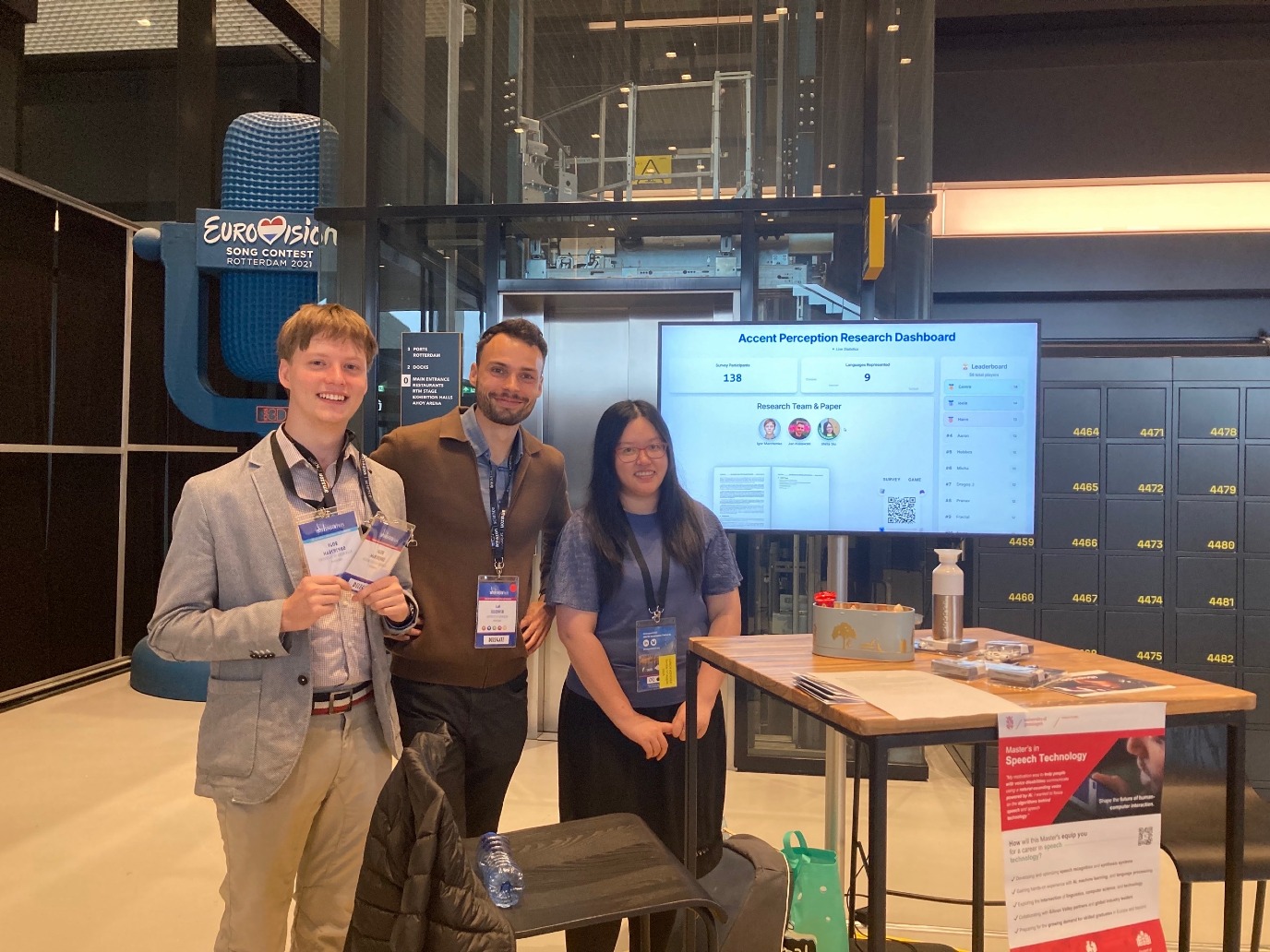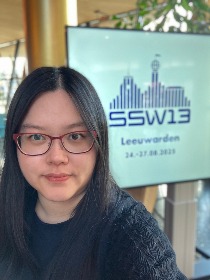From Classroom to Public Outreach Event: My Speech Technology Journey

Do you ever wonder how the theory you study or hear about can become truly relevant to real-world challenges? If so, you are in good company. Stella Siu, a recent graduate of the Speech Technology master's programme, was curious about how to bridge language and technology, and that curiosity led her to explore how her skills could make a difference. Through hands-on projects, real-world problem-solving, and participation in an internationally renowned public outreach event, Stella gained technical expertise, collaborative experience, and valuable insights into making complex research accessible and engaging for a broader audience. Read on to dive into Stella's contribution!
What first sparked your interest in language and technology, and how did that lead you to study Speech Technology?
My journey into the world of language and technology began during my Bachelor’s studies at the University of Groningen.
While I loved the theoretical side of linguistics, I kept asking myself how this knowledge could be transformed into something that directly benefits society. During that time, I noticed how patients in foreign countries often struggled to describe their symptoms to doctors and nurses, especially when they were in pain or lacked the right words. That experience sparked my interest in speech recognition and speech synthesis-technologies that can bridge communication gaps and help people in moments when words fail them.
Why did you choose this particular programme, and what stood out to you when deciding?
As my studies progressed, I also pursued a minor in Information Science, which I found both enjoyable and rewarding. Still, I hesitated to take on a full Master’s in Information Science because most students came from that background, and I worried about having to catch up with three years’ worth of knowledge. Then I discovered the Speech Technology programme, which welcomed students from different academic paths, valuing dedication and motivation as much as prior experience.
A defining moment came when I attended an online presentation and had the chance to speak with dr. Matt Coler, the Master's programme director. He encouraged me to attend a class in person since I was already in the Netherlands. That experience gave me a glimpse of the supportive and close-knit community within the programme. I could see how willing the lecturers were to help, how approachable they were, and how much they encouraged students to take on new opportunities. That sense of community, combined with the programme’s openness, convinced me this was the right path.
What do you wish you had known before starting the programme?
At one point, I was juggling coursework alongside a language class and a part-time job. While it was manageable in the end, living outside of Leeuwarden made group projects more challenging. The daily commute not only consumed valuable time but also limited the ease of collaborating with my peers. Looking back, I realize that relocating to Leeuwarden might have helped me maintain a better work-life balance and made teamwork more seamless.
Was there a project, course, or moment during your studies that really helped you grow, technically or personally?
One moment that really helped me grow was the examination in the Programming course. It was an open-book, open-website, and open-notes exam, but with no access to generative LLMs such as ChatGPT and no external help from others. Solving all the programming questions within just two hours was both challenging and exhausting, but it gave me a strong sense of what it feels like to work in the tech field: writing code under pressure, thinking critically, and problem-solving on the spot. It was a tough experience, but also a very rewarding one.
You recently participated in Interspeech 2025 in Rotterdam: what was the experience like for you?
My recent participation in the Interspeech Science Festival is one of the most memorable highlights of this programme. With encouragement from my lecturers, my group mates and I submitted a demo proposal based on one of our projects. In addition to a sample survey from part of our study, we developed an Accented Voice Guessing Game using the newest text-to-speech technology.
The experience was incredibly rewarding! One of the highlights was that over 60 people completed our game, and even more joined in for a try. Not only did I gain deeper insights into teamwork, communication, and event coordination, but I also had the chance to connect with experts from around the world who shared my passion for speech technology. I still remember professionals who were particularly interested in our prompting methods. Beyond the technical discussions, it was a joy to sit with linguists and explore the phonetic features that make different varieties of accented English distinct and unique. None of this would have been possible without the knowledge, encouragement, and support I received from this programme.

You helped set up some of the demos: can you tell us what that involved and what you learned from it?
I took on both administrative and hands-on responsibilities. On the organizational side, I oversaw progress, and managed communication across different groups. On the practical side, I worked directly with the Qualtrics-based platform, handled Asian-language stimuli generation, and completed the Dutch translations needed for both demos. While I had some event-planning experience back in my hometown, this was my first time coordinating and presenting in such an international, professional setting. The experience gave me valuable skills in teamwork, cross-cultural communication, and adapting quickly in a high-profile environment.
What were your key takeawayes from the Interspeech Science Festival, and how did they complement what you learned in the programme?
My experience at the Interspeech Science Festival really showed me how practical research can be transformed into a public outreach event. In the programme, we often worked on technical and linguistic research in an academic setting, but presenting our demos at Interspeech required us to translate that work into something engaging and accessible for a wider audience. It was exciting to see how ideas that started in the classroom could spark curiosity and discussion among people outside the immediate research community. That process taught me not only how to communicate research more clearly, but also how outreach can make speech technology feel relevant and approachable to the public.
Where do you see speech technology heading in the next few years, and how does this programme prepare students for that future?
One important trend I see in speech technology is the growing focus on low-resource languages. For example, in this programme, some lecturers work on Frisian, the language spoken in the province of Friesland where Leeuwarden is located. Through participating in workshops, I also see research on Sámi languages and their code-switching with English in northern Europe, covering both speech recognition and speech synthesis.
This is just one of several directions where the field is heading. What makes the programme valuable is how it equips students to adapt to these developments. Through diverse hands-on projects, we learn to integrate linguistic knowledge, programming skills, and practical experience with tools commonly used in the field, such as Praat and LaTeX. This combination provides a strong foundation for tackling the challenges and opportunities that lie ahead.
What advice would you give to students who want to make the most of their time here?
Most of the students in my cohort were internationals, so my advice is especially for those coming from abroad. I would encourage you to fully immerse yourself in the local environment, both socially and culturally, so it will enrich your experience beyond academics. And, on a lighter note, try to embrace the Dutch weather: think like a plant and soak it all in, whether it’s rain or sunshine! Most importantly, take every opportunity to engage with lecturers, peers, and projects. The more effort you put in, the more rewarding your time in the programme will be.
What’s next for you, and how has this programme shaped your career path so far?
At this stage, I am exploring research opportunities in the field of speech technology, but at the same time, I am also interested in opportunities at the intersection of language technology and event organization or project management, where I can combine my practical experience with the skills and knowledge I gained from this programme. The programme has not only equipped me with technical expertise but also strengthened my confidence in taking on interdisciplinary challenges and pursuing paths that merge my interests in technology, language, and collaboration.
Interested in the programme?
Check out our MSc in Speech Technology and subscribe to the monthly newsletter to stay up to date with events, deadlines, and programme-related content!
About the author

Stella Siu is a graduate of the MSc in Speech Technology offered at Campus Fryslân, University of Groningen.

